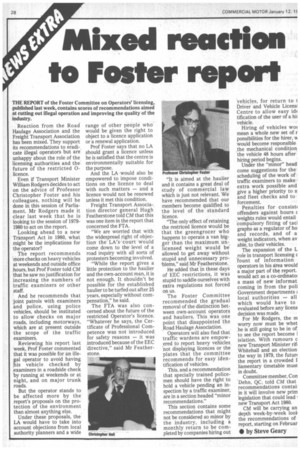Mixed reaction to Foster report
Page 30

If you've noticed an error in this article please click here to report it so we can fix it.
THE REPORT of the Foster Committee on Operators' licensing, published last week, contains scores of recommendations aimed at cutting out illegal operation and improving the quality of the industry.
Reaction from the Road Haulage Association and the Freight Transport Association has been mixed. They support its recommendations to eradicate illegal operators but are unhappy about the role of the licensing authorities and the future of the restricted 0licence.
Even if Transport Minister William Rodgers decides to act on the advice of Professor Christopher Foster and his colleagues, nothing will be done in this session of Parliament. Mr Rodgers made it clear last week that he is looking to the session of 19791980 to act on the report.
Looking ahead to a new Transport Act in 1980, what might be the implications for the operator?
, The report recommends more checks on heavy vehicles at weekends and outside office ;hours, but Prof Foster told CM that he saw no justification for increasing the numbers of traffic examiners or other staff.
And he recommends that joint patrols with examiners and police, using police vehicles, should be instituted to allow checks on major roads, including motorways, which are at present outside the scope of the traffic examiners.
Reviewing his report last week, Prof Foster commented that it was possible for an illegal operator to avoid having his vehicle checked by examiners in a roadside check by running at weekends or at night, and on major trunk roads.
But the operator stands to be affected more by the report's proposals on the protection of the environment than almost anything else.
Under these proposals, the LA would have to take into account objections from local authority planners and a wide range of other people who would be given the right to object to a licence application or a renewal application.
Prof Foster says that no LA should grant a licence unless he is satisfied that the centre is environmentally suitable for the purpose.
And the LA .would also be empowered to impose conditions on the licence to deal with such matters — and a licence would not be renewed unless it met this condition.
Freight Transport Association director general Hugh Featherstone told CM that this was one item in the report that concerned the FTA.
"We are worried that with the widespread right of objection the LA's court would come down to the level of a road inquiry with all sorts of protesters becoming involved.
"While the report gives a little protection to the haulier and the own-account man, it is not enough. It shouldn't be possible for the established haulier to be turfed out after 25 years, especially without compensation," he said.
The FTA was also con,cerned about the future of the restricted Operator's licence. "Whatever he says, the Certificate of Professional Competence was not introduced for safety reasons — it was introduced because of the EEC 'directive," said Mr Featherstone. "It is aimed at the haulier and it contains a great deal of study of commercial law which is just not relevant. We have recommended that our members become qualified to 'the level of the standard licence.
"The only effect of retaining the restriced licence would be that the greengrocer who happens to operate a van bigger than the maximum un licensed weight would be allowed to get away without stupid and unnecessary problems," said Mr Featherstone.
He added that in these days of EEC restrictions, it was stupid to saddle ourselves with extra regulations not forced on us.
The Foster Committee recommended the gradual removal of the distinction between own-account operators and hauliers. This was one point that disappointed the • Road Haulage Association.
Operators will also find that traffic wardens are empowered to report heavy vehicles, not displaying licences or the plates that the committee recommends for easy identification of vehicles.
This, and a recommendation that specially trained police men should have the right to hold a vehicle pending an inspection by a traffic examiner, are in a section headed "minor recommendations."
This section contains some recommendations that might not be considered so minor by the industry, including a monthly return to be completed by companies hiring out 'vehicles, for return to t Driver and Vehicle Licensi Centre to allow easy id( tification of the user of a hil vehicle.
Hiring of vehicles wol mean a whole new set of r ponsibilities for the hirer, IA would become responsible the mechanical condition the vehicle 48 hours after hiring period begins. Under the "minor" head. come suggestions for the scheduling of the work of traffic examiners to make extra work possible and give a higher priority to s and fleet checks and to forcement.
Penalties for consist( offenders against hours t. .weights rules would entail compulsory fitting of me] graphs as a regulator of ho and records, and of a weight indicators, when av able, to their vehicles.
The expansion of the L role in transport licensing fount of information operators in his area would a major part of the report, would act as a co-ordinatoi a mass of new informat coming in from the poli .Government departments I local authorities — all which would have to evaluated before any licens decision was made.
For Mr Rodgers, the m worry now must be whet he is still going to be in of: to see the report become I islation. With rumours c new Transport Minister rit Whitehall and an election the way in 1979, the futur( the report in a crowded liamentary timetable must in doubt.
Committee member, Con Dehn, QC, told CM that recommendations contai: in it will involve new prim legislation that could lead new Transport Act 1980.
CM will be carrying an depth week-by-week loot the recommendations of report, starting on Februar
• by Steve Geary
































































































































